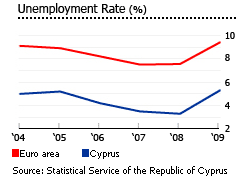Cyprus property market limps towards recovery
Cyprus enjoyed a three-year housing boom until 2008. Then the market began to fall, mainly because of lower demand from British buyers, who comprise around 70% of all foreign buyers in Cyprus. The UK recession, and the weakening of the pound against the euro, prompted British buyers to look for non-Euro destinations.
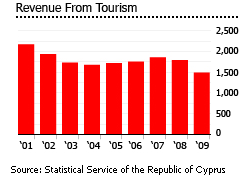
Residential property prices have fallen by as much as 20% and 30% in the past three years, with the most affected being Paphos, Sotira and other areas popular with foreign holidaymakers and retirees, according to real estate valuer Anthonis Loizou. There are as yet no long-term house price statistics, though the Royal Institution of Chartered Surveyors (RICS-Cyprus) released its first Property Price Index for Cyprus in Q1 2010
Areas that rely on local buyers, mainly from Nicosia, have been doing relatively better, with prices in Protaras and west of Larnaca (Pervolia, Kiti, Tersefanou) recording smaller drops. The Department of Lands and Surveys registering an average increase this year of 20% in property sales volumes in Cypriot-oriented areas such as Paphos, Limassol, Nicosia, and Larnaca.
DOMESTIC PROPERTY SALES - 2009/2010 COMPARISON |
|||||||||||||
| Nicosia | Famagusta | Paphos | Total Sales | ||||||||||
| 2010 | 2009 | 2010 | 2009 | 2010 | 2009 | 2010 | 2009 | 2010 | 2009 | 2010 | |||
| Jan | 93 | 151 | 25 | 34 | 51 | 77 | 118 | 129 | 40 | 85 | 327 | 476 | |
| Feb | 146 | 157 | 34 | 43 | 84 | 141 | 91 | 131 | 43 | 86 | 398 | 558 | |
| Mar | 156 | 229 | 33 | 63 | 80 | 107 | 135 | 171 | 71 | 53 | 475 | 623 | |
| Apr | 149 | 165 | 51 | 41 | 104 | 110 | 90 | 157 | 87 | 75 | 481 | 548 | |
| May | 165 | 223 | 56 | 67 | 111 | 96 | 115 | 158 | 64 | 105 | 511 | 549 | |
| Jun | 173 | 511 | 30 | 52 | 123 | 115 | 149 | 142 | 77 | 106 | 552 | 626 | |
| Jul | 217 | 219 | 84 | 54 | 100 | 84 | 162 | 184 | 89 | 89 | 562 | 630 | |
| Aug | 163 | 60 | 106 | 128 | 92 | 549 | |||||||
| Sept | 207 | 57 | 90 | 138 | 92 | 584 | |||||||
| Oct | 173 | 72 | 95 | 155 | 111 | 606 | |||||||
| Nov | 190 | 67 | 103 | 156 | 118 | 634 | |||||||
| Dec | 184 | 63 | 108 | 155 | 130 | 640 | |||||||
Source: Department of Lands and Surveys via Cyprus Property News |
|||||||||||||
This is a welcome change from 2009´s rather depressing figures which saw, among other things: a 16.7% drop tourist revenue, a 2% rise in unemployment, a 16.9% drop in the number of building permits issued, and a 1.7% drop in GDP.
Hobbled by scandal
Hopes for the recovery of the overseas housing market were dashed by reports of improper handling of permissions and property sales by certain local developers.
Cyprus´s property market has been plagued by a spate of recent scandals involving fraudulent transfers of property, the deliberate withholding of Title Deeds, and the controversy over the Cypriot government’s proposing an across-the-board amnesty for development projects of dubious legality in an attempt to relieve the growing number of problematic development schemes.
The Title Deeds (or "Certificates of Registration of Immovable Property") are legal documents all property owners in Cyprus are required to possess. Many buyers dispense with this in order to avoid the payment of Property Transfer Fees which, as of September 2010, are calculated as follows:
| 3% | |
| 5% | |
| 8% | |
source: Cyprus Property Law |
|
The problems with not having the Title Deed to one´s property, however, are myriad. It means that technically one does not own the property, despite having paid for it in full. The legal owner (the one who actually holds the Title Deed) retains the right to mortgage the property without the consent of the buyer. If the land was already mortgaged before it was sold, the legal owner has the option to extend or increase the mortgage without consent.
The most insidious problem that crops up is that of unscrupulous property developers extorting money and claiming it as payment for "immovable property tax". This has attracted the attention of the European Union, spurred by a rising number of complaints from overseas buyers frustrated with a lack of consumer protection from developers who sell property without the proper permits and permissions—or, in one well-documented case, sell the same property twice. However, as of August 2010 the European Parliament´s plans for getting at the heart of the matter have been shelved.
Property Price Index released
In January 2010 the Royal Institution of Chartered Surveyors (RICS-Cyprus) released its first Property Price Index for Cyprus in Q1 2010. Designed to track and monitor property and rental price changes in all districts in Cyprus, it details the average unit price and average monthly rent for three-bedroom semi-detached houses and two-bedroom apartments, and initial rental yield for warehouses, offices and high-street commercial retail space in various locations in Nicosia, Limassol, Larnaca, Paphos, and Famagusta-Paralimni.
Houses, office space and retail commercial space are at a premium in the capital, Nicosia. Yet the average unit price of apartments are higher in Larnaca by 9.6%, although average monthly rents are €58 lower than in the capital.
High interest rates
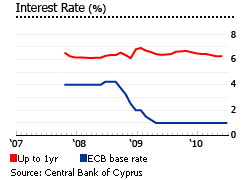
Cyprus’ interest rates are among the Euro area’s highest, though rates have fallen slightly—from a 6.44% average in Q1 2010 to a 6.28% average in Q2 2010, reaching 6.26% in June 2010. Variable-rate mortgages account for 97.8% of all housing loans in Cyprus, making the market vulnerable to interest rate shocks.
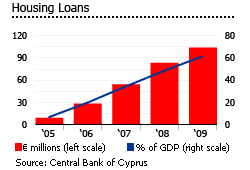
Banks in Cyprus have been slow to respond to interest rate cuts, and there is a big margin between the Central Bank key rate and their interest rates. That is because there is little inter-bank lending, so banks rely on customer deposits for funding. Many banks pay high rates to attract deposits, according to finance minister Makis Keravnos.
The adoption of the Euro in January 2008 led to a significant change in the method of calculating interest rates (from May 2008), and the data are now harmonized to the European Central Bank’s requirements.
Economic slowdown
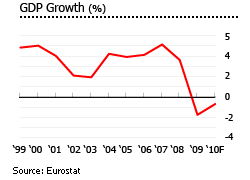
Cyprus has been somewhat shielded from the financial crisis, largely because of its low reliance on exports, prudent fiscal policies, adoption of the Euro, resilient financial sector, and limited exposure to subprime mortgages. Nevertheless in 2009 GDP fell by 1.7%, as the crisis enmeshed its key economic partners—the U.K., Greece, and Russia, with a negative projection for 2010. The year ended with the government running a deficit of 6.1% from a surplus of 0.9% the previous year. Public debt also rose significantly from 48.4% to 55.2% in 2009, with a projection of a further 60% increase by 2010. Fortunately inflation was kept in check in 2009, remaining at 0.3% (Source: US Department of State)
The number of residential building permits issued rose to 1,337 in May 2010, up 13.1% from a year earlier.
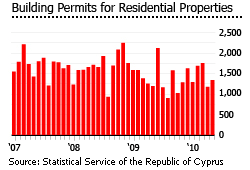
Tourism and construction play a major role in Cyprus’ economy. The service sector (including tourism) contributes 79% to GDP and employs 71% of the labour force. Tourist arrivals in July 2010 rose to 306,106, a 0.7% increase from July 2009´s record of 304,126.
Unemployment rose to 5.3% in 2009, though Cyprus still has one of the EU’s lowest unemployment rates.
